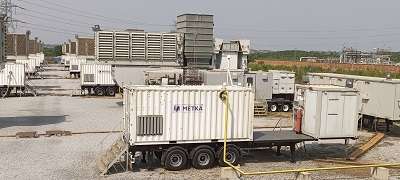The planned Atuabo gas pipeline shutdown for maintenance is not expected to trigger significant power cuts, according to Energy Analyst Kwadwo Poku, who outlined the measures being taken to safeguard supply during the two-week closure.
Poku explained that around 70 percent of Ghana’s electricity generation depends on thermal power plants, which in turn rely heavily on natural gas. Ghana Gas supplies about 100 to 110 million standard cubic feet per day from the Jubilee fields, making it a critical energy source.
The plant at Atuabo undergoes routine maintenance every year, and this year’s complete shutdown will temporarily halt that supply.
He noted that the country will lose roughly 100 million cubic feet of gas per day during the maintenance period.
However, extensive planning has been done to minimize the impact. This includes supplementing with liquid fuel, strategic scheduling, and taking advantage of the current low-demand season.
Poku pointed out that Ghana’s energy consumption patterns are seasonal. During the cooler months, typically aligned with winter in other parts of the world, demand drops by 300 to 350 megawatts from peak levels. This makes it an ideal time to conduct the necessary maintenance.
“There’s been a lot of planning that has gone into it, and naturally, there should be some outages here and there, but that is augmented with the supply of liquid fuel and also proper planning.”
Kwadwo Poku
He emphasized that the outages, if they occur, would be minimal, noting that efficient sector management could prevent widespread disruptions.

Maintenance work of this kind, he explained, has been done before without leading to severe nationwide blackouts.
Two key factors are working in Ghana’s favor: lower demand on the grid and an incremental boost in gas supply from other sources.
The Energy and Infrastructure (E&I) company has increased supply by about 30 million cubic feet per day, while an additional 30 million cubic feet is being sourced from Nigeria. This 60 million cubic feet boost helps offset the loss from Atuabo.
In addition, crude oil will be used to generate power during the shutdown. “I’m told that Cenpower has enough crude to basically take us through this 15-day period,” Poku said.
This redundancy ensures that even if the primary gas supply is offline, other fuels can keep power plants running.
Localized and Short-Lived Power Cuts Possible
While Kwadwo Poku did not dismiss the possibility of disruptions entirely, he stressed they would likely be short and localized.
Removing 100 million cubic feet of gas from the system means some plants, especially in the Kumasi enclave, will face shortages. Plants in Tema will also have a limited supply.

However, supplementary measures such as activating Cenpower with crude oil, supplying AXA with heavy fuel oil, and reducing electricity exports during peak hours can keep the domestic supply stable.
He recalled a policy directive from the previous administration that mandates prioritizing the Ghanaian market over exports when supply is tight. This allows the 200 to 300 megawatts usually sold to other countries to be redirected to local consumers during critical periods.
“If there is any load to be shed, I don’t think it will be huge,” Poku stated, reinforcing his view that Ghanaians should not expect widespread or prolonged blackouts during the Atuabo shutdown.

Meanwhile, the planned maintenance, set to span 15 days, has been carefully timed and structured to reduce the risk of significant disruptions.
Authorities have expressed strong confidence that the combination of strategic planning, diversification of fuel sources, and timely adjustments in power supply will keep the lights on for most consumers.
By coordinating gas supply alternatives, tapping into crude oil reserves, and limiting electricity exports when necessary, the energy sector aims to ensure that households and businesses experience little to no inconvenience throughout the period.
READ ALSO: Taylor Swift Announces New Album, ‘The Life of a Showgirl’























